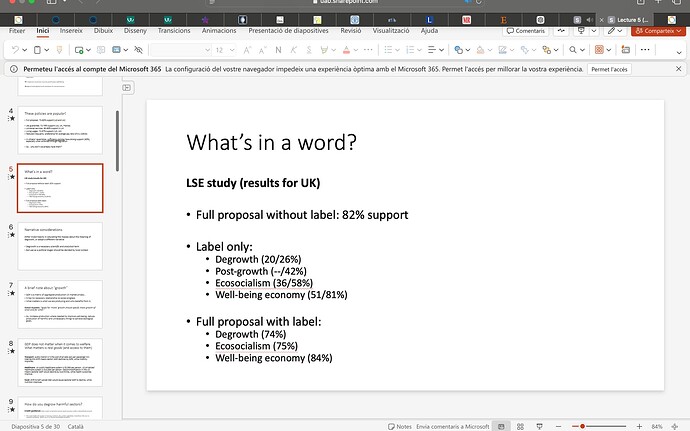@AndrewGaines I think your posts may have gotten a little lost due to the formatting of the replies on this site. I also ended up in the WeAll ecosystem after arriving at the same conclusion as you - that mindset change inevitably precedes and leads to systemic and practical change - and I came here looking for ways to become a consistent advocate to lead local conversations that will inspire that shift while hoping others are doing the same in their communities. In short, to “take action”.
So far I’ve been disappointed to learn that there are very few clear routes to take action, and even within this forum as evidenced by @Kevin and @JWGCox’s debate, there’s certainly no established outline for advocacy and it’s unclear if advocacy even works at all in countering the massive machine of entrenched growth culture.
It sure is frustrating for someone like me with a 15+ year business career to be lead here, after many years of introspection, after finally understanding the root of my dissatisfaction with it, and to be ready to reform my work into something more purpose-based, just to find dead-end or circular conversations.
I want to know: What is ACTION? It seems you suggest doing what I, and many of us, already do - talk to people. What can I do besides talk to my friends and family and shout into the void on social media and this forum? IMO that doesn’t get us anywhere - most people don’t want to fill their days with uncomfortable conversations, and even fewer will change their minds over a conversation. The WSJ recently published a really fascinating glimpse into just how rigid people’s convictions are in a study called “We Put 12 Strangers In a Group Chat About the Economy… It Got Personal.” Link is probably paywalled, sorry.
From looking at your site, it seems that your organization (and dozens or even hundreds of others directly or tangentially associated with WeAll) believes that you can turn around that taxi-driver pessimism you mentioned in your article on a global scale if We All just say the right things to everyone we know. But that will never happen in reality, and would take longer than we have time left on the planet.
Besides, those interested in being ambassadors of the Wellbeing Economy don’t need more convincing - they already found their way here, are already mobilized, and are ready to take some next steps (if only they were clear). I was saying elsewhere in this thread, the audience that needs to be reached is not the ones that come here on their own - it is the majority of the population that is currently unwilling to listen and not sufficiently motivated to impose responsible limits on ourselves.
That said, I used to be a staunch Randian capitalist. I believed my individuality was especially strong, that I could outwork everyone, become a titan of industry. But my belief in the system was shaken. I did everything “right” and never had enough. I’ve changed. People CAN change. I didn’t need a lifetime in NGO’s, think tanks, policy work, climate science, or philosophy, and yet I’ve still arrived here. Most people are like me, just trying to get by in a world that feels stacked against them. They can get here too, when they realize there is no “winning” this game by continuing to play it.
It won’t be a website that makes that click all at once, or articles, or documentaries, though there’s an important place for all of those. It will be curiosity in themselves, in their sadness and depression and struggles, their feelings of failure or inadequacy, their fears about money or environment, that sparks a fire to understand their role in the current system. EVERYONE feels these things - even the rich. We are unanimously united in a state of discontent. In other words, we feel “stuck”.
I don’t think we need more talk and talk and talk saying “psst the world is burning, pass it on.” We need to ask, not tell. We need to ask WHY? And instead of asking why the world is burning… ask “why are you STUCK?”
Ask WHY again and again, to every subsequent answer, over a long enough time, I’m 100% confident everyone that honestly tries to answer will end up here. (For clarity, when I say “here” I don’t mean WeAll, per se, I mean with a Wellbeing Economy mindset - call it what you will).
Personally, I do have an idea for action. It’s simple. It’s funny. It’s viral. It’s multi-modal and multi-lingual. It’s organic (literally). It’s emblematic of our biggest problems. If I share the idea it will be dissected and analyzed and quite possibly rejected simply because it can’t be fully explained with reason. But neither can our current system, and that’s kind of the point. At least if it takes off, everyone here will know what it is 
